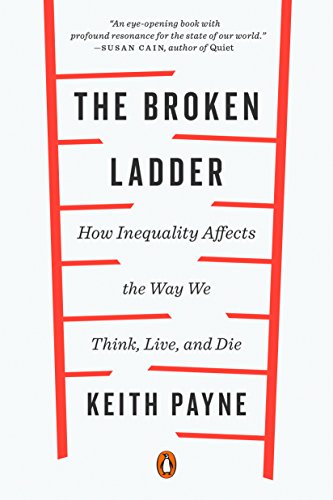Facts and Fears: Hard Truths from a Life in Intelligence: The former Director of National Intelligence’s candid and compelling account of the intelligence community’s successes–and failures–in facing some of the greatest threats to America When he stepped down in January 2017 as the fourth United States director of na…
Today’s inequality is on a scale that none of us has seen in our lifetimes, yet this disparity between rich and poor has ramifications that extend far beyond mere financial means. In The Broken Ladder psychologist Keith Payne examines how inequality divides us not just economically, but has profound consequences for how we think, how our cardiovascular systems respond to stress, how our immune systems function, and how we view moral ideas like justice and fairness. Experiments in psychology, neuroscience, and behavioral economics have not only revealed important new insights on how inequality changes people in predictable ways, but have provided a corrective to our flawed way of viewing poverty as the result of individual character failings. Among modern, developed societies, economic inequality is not primarily about money, but rather about relative status: where we stand in relation to other people. Regardless of their average income, countries or states with greater levels of income inequality have much higher rates of all the social problems we associate with poverty, including lower average life expectancies, serious health issues, mental illness, and crime.
Democracy in Chains: The Deep History of the Radical Right’s Stealth Plan for America: Finalist for the 2017 National Book Award “[A] vibrant intellectual history of the radical right . . .” – The Atlantic “This sixty-year campaign to make libertarianism mainstream and eventually take the government itself is at the heart of Democracy in Chains. . . . If you’re worried about what all this means for America’s future, you should be” – NPR An explosive exposé of the right’s relentless campaign to eliminate unions, suppress voting, privatize public education, and change the Constitution. Behind today’s headlines of billionaires taking over our government is a secretive political establishment with long, deep, and troubling roots. The capitalist radical right has been working not simply to change who rules, but to fundamentally alter the rules of democratic governance. But billionaires did not launch this movement; a white intellectual in the embattled Jim Crow South did. Democracy in Chains names its true architect—the Nobel Prize-winning political economist James McGill Buchanan—and dissects the operation he and his colleagues designed over six decades to alter every branch of government to disempower…
April 2014 marks the 75th anniversary of the first Viking hardcover publication of Steinbeck’s crowning literary achievement
First published in 1939, Steinbeck’s Pulitzer Prize-winning epic of the Great Depression chronicles the Dust Bowl migration of the 1930s and tells the story of one Oklahoma farm family, the Joads, driven from their homestead and forced to travel west to the promised land of California. Out of their trials and their repeated collisions against the hard realities of an America divided into haves and have-nots evolves a drama that is intensely human yet majestic in its scale and moral vision, elemental yet plainspoken, tragic but ultimately stirring in its human dignity.
The Party Is Over: How Republicans Went Crazy, Democrats Became Useless, and the Middle Class Got Shafted
The New York Times–bestselling manifesto about America’s broken political system and how it got that way Mike Lofgren’s The Deep State is now available from Viking Mike Lofgren was once a proud Republican. When he came to Washington in the early 1980s, the party was controlled b…




